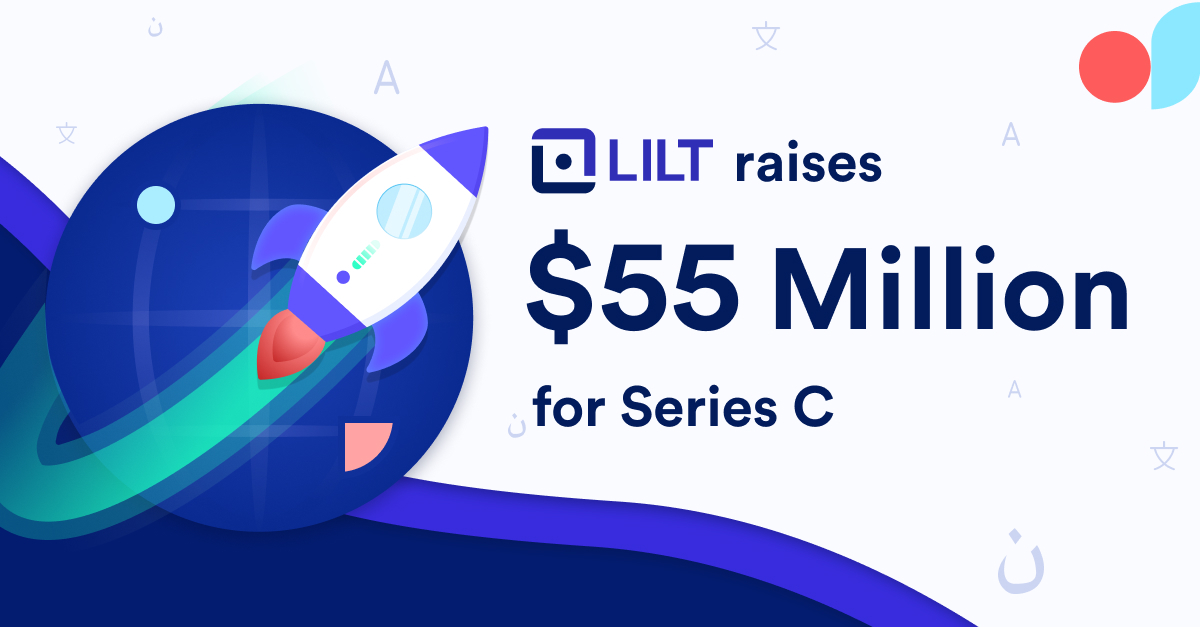Announcing Lilt's Series B Financing

The languages one learns as a child will influence nearly every aspect of their life: their community, their access to information, and even their career prospects. I observed this most acutely while living in the Middle East, where I met bright and ambitious people who were often cut off from intellectual work because they didn't speak English. While the capacity for language is shared by all of humanity and one of the most fascinating aspects of human intelligence, language differences can divide us socially and economically.
My co-founder John and I have spent our careers developing artificial intelligence technology related to human languages. The last decade has transformed the field. Computers still can't use and understand language like people do, but automatic translation technology is now undeniably useful in assisting people to write more quickly and accurately. We founded Lilt in order to maximize the impact of this technology for information access.
Institutions—businesses, governments, and universities—are the stewards of the world's most critical written knowledge. We reasoned that if we could make translation more efficient and affordable for these organizations, then everyone would have access to more opportunity. Consumers are already exercising choice by activating machine translation in their information tools (i.e., browsers, phones, email apps, etc.) when they encounter language barriers. That's great, but it means that organizations routinely lose control of linguistic quality, brand identity, and data security.
What if we could enable organizations to proactively remove that language barrier?
Today I am pleased to announce that Intel Capital has led our $25M Series B financing to accelerate this mission. Mark Rostick, VP and Senior Managing Director at Intel Capital, has joined our board. Our existing investors—Sequoia Capital, Redpoint Ventures, Zetta Venture Partners, and XSeed Capital—all participated in the round.
We met Intel Capital through Intel Corporation. Last summer we started working with Intel to re-think their main enterprise localization workflow. Our technology-enabled services have enabled Intel to increase quality and turnaround time while reducing costs by 40% year-over-year. As the commercial program accelerated, a deeper partnership discussion began. By late last year we decided to cement the partnership with an investment.
While COVID-19 has compelled all of us to re-evaluate long-held beliefs, we are more certain than ever that:
- The future of work will be increasingly digital.
- The future of commerce will be increasingly online.
Businesses that strategically expand their digital reach to all stakeholders—customers, employees, partners—are certain to find new opportunities.
We'll invest this new capital to help our customers—and as a consequence their customers—access opportunity. We'll focus on four areas: customer enablement, research and product, our service model, and people.
Customer Enablement
Today Lilt has two customer offerings:
- Technology-enabled services: Text localization services and software for businesses.
- Language infrastructure software: A complete language software stack, primarily for on-premise government applications.
These offerings differ only by the manager of the professional translators. Businesses typically do not employ full-time translators, so Lilt sources and retains them; security-conscious governments typically do. Our intelligent software makes both workloads radically more efficient.
For the technology-enabled services offering, we've learned that for the majority of businesses:
- Translation is not a core competency, and
- They are encumbered with legacy systems and thinking.
There's a decades-old playbook: run an RFP for a translation management system (TMS), run an RFP for a service provider (or three), dip your toe in machine translation, but don't let it near the "serious" content. This is the oatmeal of localization: it prevents starvation and it might even reduce the risk of heart disease, but it won't win any awards for creativity. Our task is to partner with and empower our pioneering customers to realize transformational business outcomes: shred the existing playbook and re-think language operations to expand global reach.
For the language infrastructure offering, we've learned that the volume of information that national security organizations must analyze far exceeds their human capacity. They must close the gap with technology. Our tasks are to integrate our software infrastructure into mission-critical pipelines, and to equip analysts with productivity-enhancing technology in the most sensitive applications.
Research and Product
Lilt believes that next-generation localization requires purpose-built machine learning systems. Simple engine customization isn't enough. There are a range of interesting, open research problems that we are expanding our team to investigate:
- Online domain adaptation
- Mixed-initiative systems and collaborative online work
- Grammatical error correction
- Application of classic NLP algorithms to localization-specific tasks such as tag and terminology handling
Because our systems are purpose-built from scratch, our customers benefit from the latest breakthroughs in AI research that apply to localization. Moreover, governments like that our integrated infrastructure can deploy in on-premise environments without any dependencies on third-party cloud systems.
Read about our research team and publications at Lilt.ai.
Service Model
We view business as partnership. Global enterprises demand round-the-clock, follow-the-sun supply-chain partners. To increase supply-chain flexibility we're investing in production:
- Broader timezone coverage: We've recently opened new offices in Indianapolis, Indiana and Dublin, Ireland.
- Additional linguistic services: We're introducing both text pre- and post-processing services.
- Translator community: We'll expand training and support for our community of world-class freelance translators (aka, the "Liltlancers").
Read more about our service model.
People
Language translation in both the public and private sectors is a complex, operationally intense process. The manual methods of yesterday can't scale with the volume of digital information produced in the world today. Today, businesses often compromise their non-English customer experiences due to scale and cost.
We're writing the playbook for the vertically-integrated, technology-enabled supplier that can give our customers a better option. We need tough, humble, quick, and meticulous people to write the playbook from initial outreach to full-scale production.
To attract curious, growth-oriented people, we must provide hard problems, intellectual freedom, and avenues for personal and professional development. We're investing in onboarding, learning, and development programs not only for our full-time staff but also for the Liltlancers.
We're also investing in a strong leadership team from both the language and technology industries. Senior people from Salesforce, Lionbridge, Welocalize, and SDL have recently joined our team.
In 2011 when John and I first started working on machine translation together at Google, we were amazed to learn that Google’s localization team didn't use Google Translate. A decade later we remain amazed that the majority of companies and governments have not embraced machine learning to expand their global digital reach. The information-access baseline is still low. We started Lilt so that organizations can aim high.
If you're a business, government, or university intent on expanding global reach, then contact our solutions team through our website.
If you're a professional translator looking to partner with great organizations, then apply to join our community.
Finally, if you care deeply about language and information access and want to join our team, then read more about Careers at Lilt.

